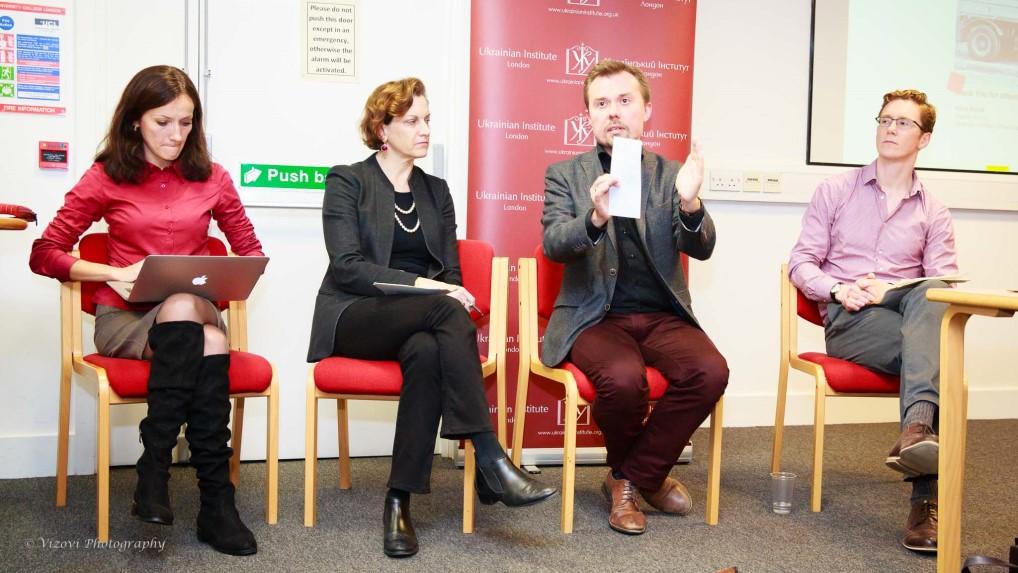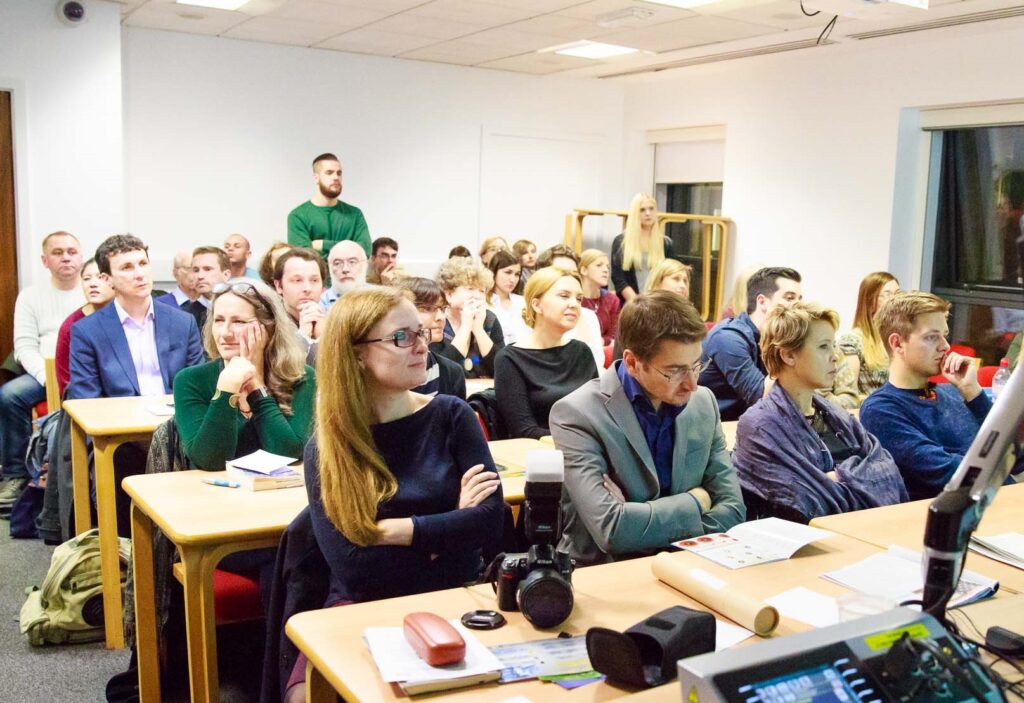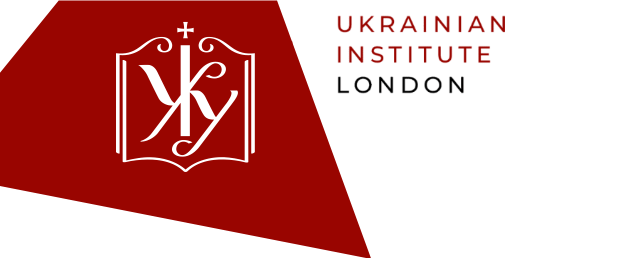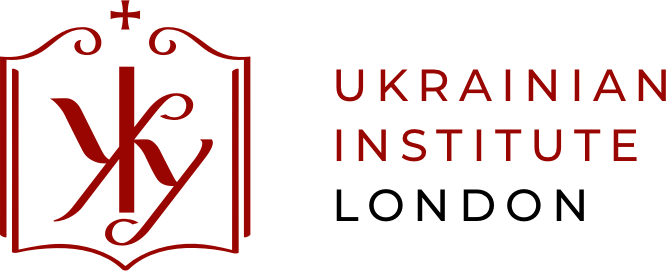A discussion on identity and historic memory in Ukraine with Anne Applebaum, Alina Shpak and Andrii Portnov.

AUTHOR
Ukrainian Institute London
“Nobody, not in western or eastern Europe or in Russia, has ever done it in a way which is regarded as satisfactory. The debate on how you commemorate the past becomes part of contemporary politics in almost whatever you do,” said Anne Applebaum, a columnist and historian, during a panel discussion devoted to the issue of identity and historic memory in Ukraine, held on November 1, 2016. The debate was organised by the Ukrainian Institute London, an affiliate of the Ukrainian Catholic University, and held in partnership with the School of Slavonic and Eastern European Studies at University College London.
Where is the fine line between propaganda and a need for a coherent and consistent policy on history in a country which has long been deprived of a historic memory of its own?
What is the role of the state in shaping these policies? Where is the fine line between propaganda and a need for a coherent and consistent policy on history in a country which has long been deprived of a historic memory of its own? Some 100 people attended the debate, which also featured Alina Shpak, Deputy Director of Ukraine’s Institute of National Memory, and Berlin-based Ukrainian historian Andrii Portnov. This was a timely moment for a frank discussion as Ukraine pursues policies of “decommunisation”, including re-naming cities, removing symbols of the totalitarian past and establishing the status of “fighters for Ukraine’s freedom”. Ukraine had previously come under fire from western media and scholars, who condemned the policies as undemocratic and nationalistic. By organising such a debate, the Ukrainian Institute London provided a platform for the Ukrainian Institute of National Memory to confront its critics head-on.
Alina Shpak, the Deputy Director of the Institute of National Memory, provided some crisp statistics: out of 30,000 Ukrainian towns and villages, 987 were renamed following “decommunisation” and 80% of those renamed were the result of local councils’ decisions following a six-month deliberation period, she said. Equally, the will of local communities was the main driving factor behind the unveiling of some 40+ Stepan Bandera statues, all of them in western Ukraine, she said. Ms Shpak rejected claims that the Institute glorifies the armed movements of WW2 such as OUN/UPA, which also stand accused of committing atrocities. “What the law states,” she added, is “legitimisation of their struggle for Ukraine’s independence, along with many other armed formations. It does not proclaim any of them to be a hero, does not idealise any single person among them.”

Alina Shpak, the Deputy Director of the Institute of National Memory, provided some crisp statistics: out of 30,000 Ukrainian towns and villages, 987 were renamed following “decommunisation” and 80% of those renamed were the result of local councils’ decisions following a six-month deliberation period, she said. Equally, the will of local communities was the main driving factor behind the unveiling of some 40+ Stepan Bandera statues, all of them in western Ukraine, she said. Ms Shpak rejected claims that the Institute glorifies the armed movements of WW2 such as OUN/UPA, which also stand accused of committing atrocities. “What the law states,” she added, is “legitimisation of their struggle for Ukraine’s independence, along with many other armed formations. It does not proclaim any of them to be a hero, does not idealise any single person among them.”
Image: The audience at the panel discussion. Photo: Vizovi Photography.
The historic memory left behind by Soviet rule should not be rejected wholesale
Andrii Portnov pointed out that the historic memory left behind by Soviet rule should not be rejected wholesale, as happened in East Germany after the reunification of Germany. He said: “Maybe Ukraine needs a painful discussion on its not just being a victim, but also being a successor to Soviet Ukraine. Do we accept Putin’s idea that the only successor to the Soviet Union is the present-day Russia? Who will use and play with the Soviet past, including the victory over Nazism in present-day Europe?”
The internal divisions which exist inside Ukraine over its past, especially over the narrative of WW2, were highlighted by the documentary “Alive and Undefeated” (“Живі та нескорені”), produced by Videoacademy DOCemotion at the School of Journalism of the Ukrainian Catholic University (UCU), Lviv, Ukraine. A snapshot of today’s Ukraine, it told the story of a clash between two choirs of pensioners, featuring Soviet WW2 songs versus songs of the Ukrainian nationalist underground.
The debate on how you commemorate the past becomes part of contemporary politics in almost whatever you do
The debate raised an important question: what is the role the state should play in the shaping of identity and national memory? “Commemorative policies have to be systemic,” said Alina Shpak. “Ukrainians were deprived of their history, not allowed to speak aloud. Russia uses the “Great Patriotic War” myth to mobilise Ukrainians to fight against their own country. It is a national security issue for Ukraine,” she added. “The debate on how you commemorate the past becomes part of contemporary politics in almost whatever you do,” agreed Anne Applebaum. “There’s an undercurrent of traumatic past in many countries. Poland’s case was messy and chaotic. What is important is to avoid politicisation and encourage debate. The more of it, the more of a nation you become. Find a variety of heroes you can be proud of. You cannot just keep repeating ‘we are a victim’.”
Andrii Portnov took this point further: “Ukraine is a post-Soviet pluralistic society. I am sceptical of unity. This pluralism helps Ukraine to survive.”
Watch the event recording on our YouTube channel.



